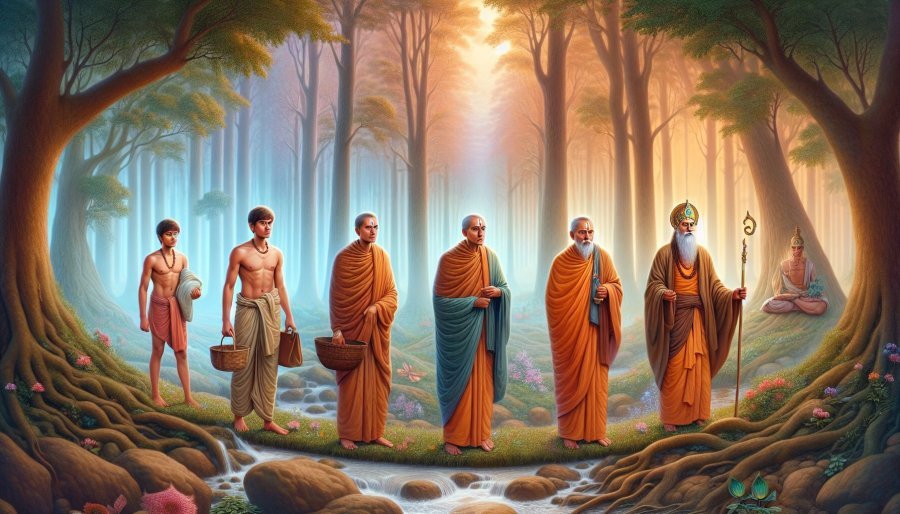Section XCI - Types of Munis and their way of life for spiritual merit
Book index: Mahabharata (English)
This page contains a summary of the Mahabharata Section XCI including examples of moral lessons in daily life. The Maha-Bharata is one of the largest epics ever written containing roughly 100,000 Sanskrit verses. It deals with the legendary history of ancient India and contains a large number of interwoven tales.

Short summary of the chapter:
Yayati describes the proper conduct for individuals following the different modes of life, such as Brahmacarins, Grihasthas, Bhikshus, and Vanaprasthas. He emphasizes the importance of humility, service, control of passions, charity, and abstaining from harmful actions to achieve success in each mode. He also explains the characteristics and behaviors of Munis, or observers of the vow of silence, who live in the woods or in inhabited places while maintaining a detached and ascetic lifestyle.
Yayati explains that Munis are those who withdraw themselves from worldly objects and live in the woods or in inhabited places with the same ascetic power. They may live a hermit-like life in a hamlet, remain humble without pride in family or possessions, and be content with minimal food and clothing. By controlling their passions, adopting a vow of silence, and refraining from desire and action, Munis can achieve spiritual success and communion with Brahma.
Yayati highlights the virtues of reverencing individuals who lead a pure and ascetic life, refrain from harming others, and practice austerities to conquer worldly desires. He explains that through yoga meditation, detachment from worldly pleasures, and indifference to praise or criticism, Munis can attain salvation and unity with the universe. By dining on food like animals (without pre-planning or enjoyment), Munis can transcend their individual selves and merge with the all-pervading spirit of existence.
Full English translation:
This page is merely a summary which is automatically generated. If you are looking for authentic sources such as the Sanskrit text or the Full English translation of Mahabharata Section XCI - Types of Munis and their way of life for spiritual merit, have a look at the following articles:
Section XCI, online text
English translation by Kisari Mohan Ganguli.
Read this and other chapters online.
Mahabharata (English Summary)
by Kisari Mohan Ganguli | ISBN-10: 8121505933
Buy the latest edition:
FAQ of Mahabharata, Section XCI:
What are the different modes of life described in the story?
The four modes of life are Grihasthas, Bhikshus, Brahmacarins, and Vanaprashthas. Each has specific duties and behaviors for acquiring religious merit.
What qualities should a Brahmacarin possess according to the story?
A Brahmacarin should be humble, have passions under control, be patient, vigilant, and devoted to studies. They must also serve their preceptor diligently and conduct themselves with discipline.
How does the story describe the characteristics of a Muni?
A Muni is someone who withdraws from worldly objects, lives in the woods, possesses ascetic powers, refrains from action, and maintains purity of heart. They may live in solitude or communities, but always practice self-control and detachment.
Daily life: Types of Munis and their way of life for spiritual merit:
The teachings drawn from the discussion between Ashtaka and Yayati offer guidance on living a life rich in spirituality and ethical conduct across various stages of life. For someone in the learning phase, akin to a Brahmacarin, the essence is to respect and serve one's mentor, maintain humility, self-control, and a devoted pursuit of knowledge. This foundational stage emphasizes the importance of discipline and dedication in personal and intellectual growth.
For householders, the advice revolves around earning honestly and giving back to society through sacrifices, charity, and hospitality. This stage of life encourages balancing material responsibilities with spiritual and societal obligations, fostering a harmonious community life.
Those who seek deeper spiritual truths, akin to Munis or Bhikshus, are advised to live with minimalism, self-restraint, and independence from worldly ties, promoting a life of reflection, self-sufficiency, and constant movement towards enlightenment.
Finally, the journey towards renunciation, or the Vanaprastha stage, calls for a deliberate withdrawal from earthly desires and possessions, focusing on achieving inner peace and readiness for transcendence.
In summary, across all stages of life, the emphasis is on discipline, self-control, service to others, and a gradual detachment from worldly desires to achieve spiritual enlightenment. Adopting these principles in daily life can lead to a fulfilling existence that balances material and spiritual well-being.
